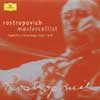Rostropovich - Master Cellist
Two handsome celebratory sets‚ though DG’s wisely sticks to what he does best –Êthe cello
View record and artist detailsRecord and Artist Details
Composer or Director: Sergey Rachmaninov, Mstislav Rostropovich, Franz Schubert, Antonín Dvořák, Fryderyk Chopin, Robert Schumann, Alexander Konstantinovich Glazunov, Pyotr Ilyich Tchaikovsky
Genre:
Orchestral
Label: DG
Magazine Review Date: 6/2002
Media Format: CD or Download
Media Runtime: 134
Mastering:
Stereo
Mono
ADD
Catalogue Number: 471 620-2GM2

Tracks:
| Composition | Artist Credit |
|---|---|
| Concerto for Cello and Orchestra |
Antonín Dvořák, Composer
Antonín Dvořák, Composer Berlin Philharmonic Orchestra Herbert von Karajan, Conductor Mstislav Rostropovich, Composer |
| Andante cantabile |
Pyotr Ilyich Tchaikovsky, Composer
Berlin Philharmonic Orchestra Mstislav Rostropovich, Cello Pyotr Ilyich Tchaikovsky, Composer |
| Chant du ménéstrel |
Alexander Konstantinovich Glazunov, Composer
Alexander Konstantinovich Glazunov, Composer Boston Symphony Orchestra Mstislav Rostropovich, Composer Seiji Ozawa, Conductor |
| Sonata for Cello and Piano |
Sergey Rachmaninov, Composer
Alexander Dedyukhin, Piano Mstislav Rostropovich, Composer Sergey Rachmaninov, Composer |
| Introduction and Polonaise brillant |
Fryderyk Chopin, Composer
Alexander Dedyukhin, Piano Fryderyk Chopin, Composer Mstislav Rostropovich, Composer |
| Vocalise |
Sergey Rachmaninov, Composer
Alexander Dedyukhin, Piano Mstislav Rostropovich, Composer Sergey Rachmaninov, Composer |
| Impromptus, Movement: No. 3 in G flat |
Franz Schubert, Composer
Alexander Dedyukhin, Piano Franz Schubert, Composer Mstislav Rostropovich, Composer |
| Kinderszenen, Movement: Träumerei |
Robert Schumann, Composer
Alexander Dedyukhin, Piano Mstislav Rostropovich, Composer Robert Schumann, Composer |
Author: kYlzrO1BaC7A
Discover the world's largest classical music catalogue with Presto Music.

Gramophone Digital Club
- Digital Edition
- Digital Archive
- Reviews Database
- Full website access
From £8.75 / month
Subscribe
Gramophone Full Club
- Print Edition
- Digital Edition
- Digital Archive
- Reviews Database
- Full website access
From £11.00 / month
Subscribe
If you are a library, university or other organisation that would be interested in an institutional subscription to Gramophone please click here for further information.




